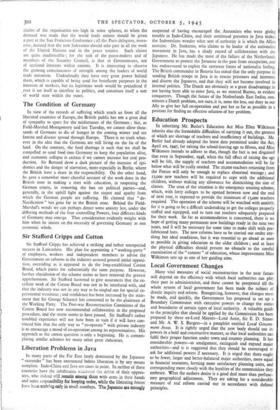Sir Stafford Cripps and Cotton
Sir Stafford Cripps has achieved a striking and rather unexpected success in Lancashire. His plan for appointing a " working-party " of employers, workers and independent members to advise the Government on reforms in the industry aroused general initial opposi- tion, overriding as it appeared to do the long-established Cotton Board, which exists for substantially the same purpose. However, further elucidation of the scheme seems to have removed the gravest apprehensions. Sir Stafford hastened to give assurances that the ex- cellent work of the Cotton Board was not to be interfered with, and that the industry was not in any way to be singled out for special ex- perimental treatment ; and confidence has been increased by the state- ment that Sir George Schuster has consented to be the chairman of the Working Party. The Post-war Reconstruction Committee of the Cotton Board has now recommended collaboration in the proposed procedure, and tl-c storm seems to have passed. Sir Stafford's rather troubled experience will not have been in vain if it will have con- vinced him that the only way to " co-operate " with private industry is to encourage a mood of co-operation among its representatives. His approach to the cotton question is only a beginning. He is contem- plating similar schemes for many other great industries.


























 Previous page
Previous page